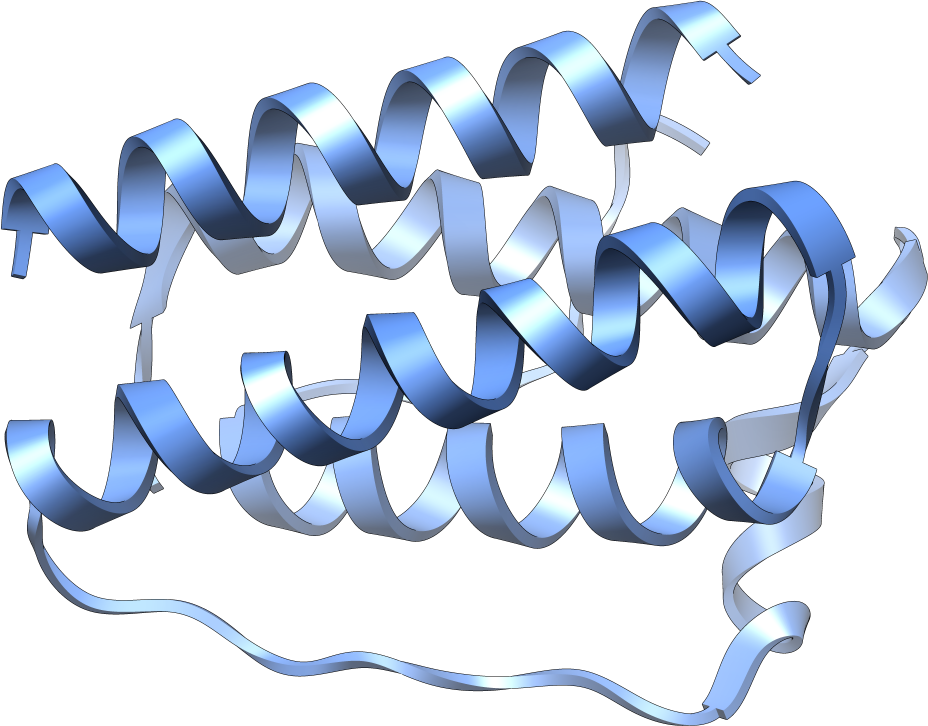Food and sex and leptin- OH MY!
One of the common symptoms of eating disturbances (whether an eating disorder or other type of malnutrition) in females is a loss of periods. I've written about this before here. Previous research had focused on the hormone ghrelin as a culprit for amenorrhea. However, researchers at the Salk Institute in San Diego have now found that leptin works as a "master switch" in regulating both appetite and reproduction.
 Leptin (see picture at right) is synthesized by adipose cells and stimulates you to feel full. People with anorexia have unusually high levels of leptin (telling them that they are full and don't need to eat). This provides one aspect of how people with AN remain unable to eat even during starvation. On the converse side, people with a rare genetic mutation making them unable to synthesize an active form of leptin cannot seem to stop eating, and are obese from very young ages.
Leptin (see picture at right) is synthesized by adipose cells and stimulates you to feel full. People with anorexia have unusually high levels of leptin (telling them that they are full and don't need to eat). This provides one aspect of how people with AN remain unable to eat even during starvation. On the converse side, people with a rare genetic mutation making them unable to synthesize an active form of leptin cannot seem to stop eating, and are obese from very young ages.Researchers have also known that leptin is produced by the placenta and other fetal tissue, leading pregnant women to have higher-than-usual levels of leptin. Other of leptin's links to reproduction appeared slightly more indirect. Women without enough body fat have lower levels of leptin and also tend to have a much more difficult time becoming pregnant.
But now it appears that leptin can toggle one master switch in the brain (known as TORC1) that regulates both appetite and reproduction.
"This gene is crucial to the daisy chain of signals that run between body fat and the brain," says Marc Montminy, Ph.D., a professor in the Clayton Foundation Laboratories for Peptide Biology, who led the study. "It likely plays a pivotal role in how much we, as humans, eat and whether we have offspring."
It is just as important as leptin, the well-known star regulator of appetite, Montminy says, because leptin turns on TORC1, which in turn activates a number of genes known to help control feeding and fertility...
Leptin tells the brain that times are good, your body is full, and that it is not necessary to eat more at the moment," Montminy says. The hormone also is known to play a role in reproduction - although, until this study, no one understood what is was. (Very thin women often do not have periods.)
"Controlling appetite and reproduction together provides a big evolutionary advantage," Montminy says. "If there is no food, the brain believes the body should not reproduce because without body fat, a baby's growth in the womb could be stunted, and without food to replenish the body's energy reserves, there will be nothing to feed the offspring."
"Leptin works remarkably well to give the brain a good indication of how much food has been eaten; 99.9 percent of the time it balances food intake with energy use," he says. "The problem is that no machine works 100 percent of the time, and that slight bit of inefficiency can lead to extra body weight."
Or, of course, an imbalance of leptin could lead to not enough body weight, but no one seems to treat that with quite the same concern.
Mice without the TORC1 gene were deaf to the siren calls of leptin, leading to (yep) obesity as well as infertility. And the gene is now being studied as a "potential drug target." Again, for obesity and not anorexia.
My petulance about the lack of attention paid here to the possible links to anorexia aside, this research shows how this one little hormone can have a multitude of effects, and how eating and reproduction are so biologially linked.






4 comments:
I just find this whole line of research fascinating!!
I know- I think it's great they're looking at this. Anorexia is a disease associated with abnormal leptin levels, but there are others that can also be deadly. And it's really fascinating.
You should have a look at the amazing work of Ron Rosedale. He has a very solid unified theory of how insulin and leptin are responsible for both the so called age related dieseases and the high prevalence of obesity.
I'm following his dietary recomendations (which are quite different from the destructive food pyramid) and the biological changes I've seen in myself are astounding.
His diet aims to normalise leptin levels. Very few people have the polymathic view that Rosedale has of the subject and his broad knowledge base has given him a unique, and I believe the correct view of human ageing, disease, and nutrition.
Of course pharmaceutical companies are not thrilled at the prospect of his suggestions becoming widely adopted, as the multi billion dollar cash cows will be endangered.
Thankfully for big pharma most people suffer from a mental debilitation called "Cognitive Dissonance" and they have an amazing propensity to dismiss good advice that doesn't fit in with their world view.
ND,
Personally, I don't agree with any kind of diet, except for very specific health condiitons (allergies, etc). Obviously, people with diabetes need to monitor their carb intake. But I also believe in something called Intuitive Eating, where the person eats what they want, eats when they are hungry, and stops when they are full.
And considering that this is a blog for people in recovery from eating disorders, I don't think diet advice is appropriate.
Post a Comment